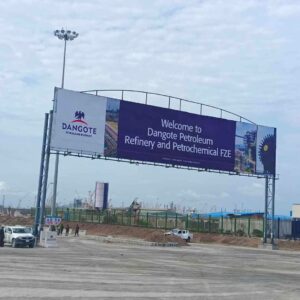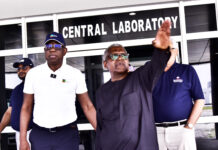“Our first products will be in the market before the end of July, beginning of August this year.”
Aliko Dangote, the Nigerian billionaire businessman, says the Dangote Refinery will supply its first tranche of petroleum products to the market before the end of July.
The business tycoon spoke on Monday at the inauguration of the 650,000 barrels per day (BPD) integrated refinery project located in the Lekki free trade zone area of Lagos state.
The project, which cost $19 billion, is said to be Africa’s largest oil refinery and the world’s largest single-train facility.
The combined refinery and petrochemical complex will create 9,500 direct jobs and 25,000 indirect jobs.
Speaking at the landmark event, Dangote said the commissioning ceremony is the beginning of a great journey, adding that it is a milestone in a new and exciting trajectory for Nigeria’s oil and gas downstream sector.
“It is our firm commitment that we will replicate in this sector what we have actually achieved in the cement and fertilizer markets while Nigeria transformed from being the largest importer of these crude products to a net exporter,” he said.
“Our first goal is to ramp up projections of various production to ensure that within this year, we are able to fully satisfy our nation’s demand for higher quality products to enable us to eliminate the tragedy of import dependency and stop, once and for all, the dumping in our market of toxic substandard petroleum products.

“Our first products will be in the market before the end of July, beginning of August this year.”
Speaking further, Dangote said the company will ensure that its plants are run at the highest capacity utilisation and the highest efficiency to enable the refinery to export competitively to other markets.
He added that the operationalisation of the refinery is a clear opportunity for Nigeria given the African Union’s commitment to the creation of an African common market through the recently established African Continental Free Trade Area (AfCFTA).
Furthermore, the Dangote Group founder said once the plant is fully commissioned, it is expected that at least 40 percent of the capacity will be available for export, adding that it will result in significant foreign exchange into the country.












